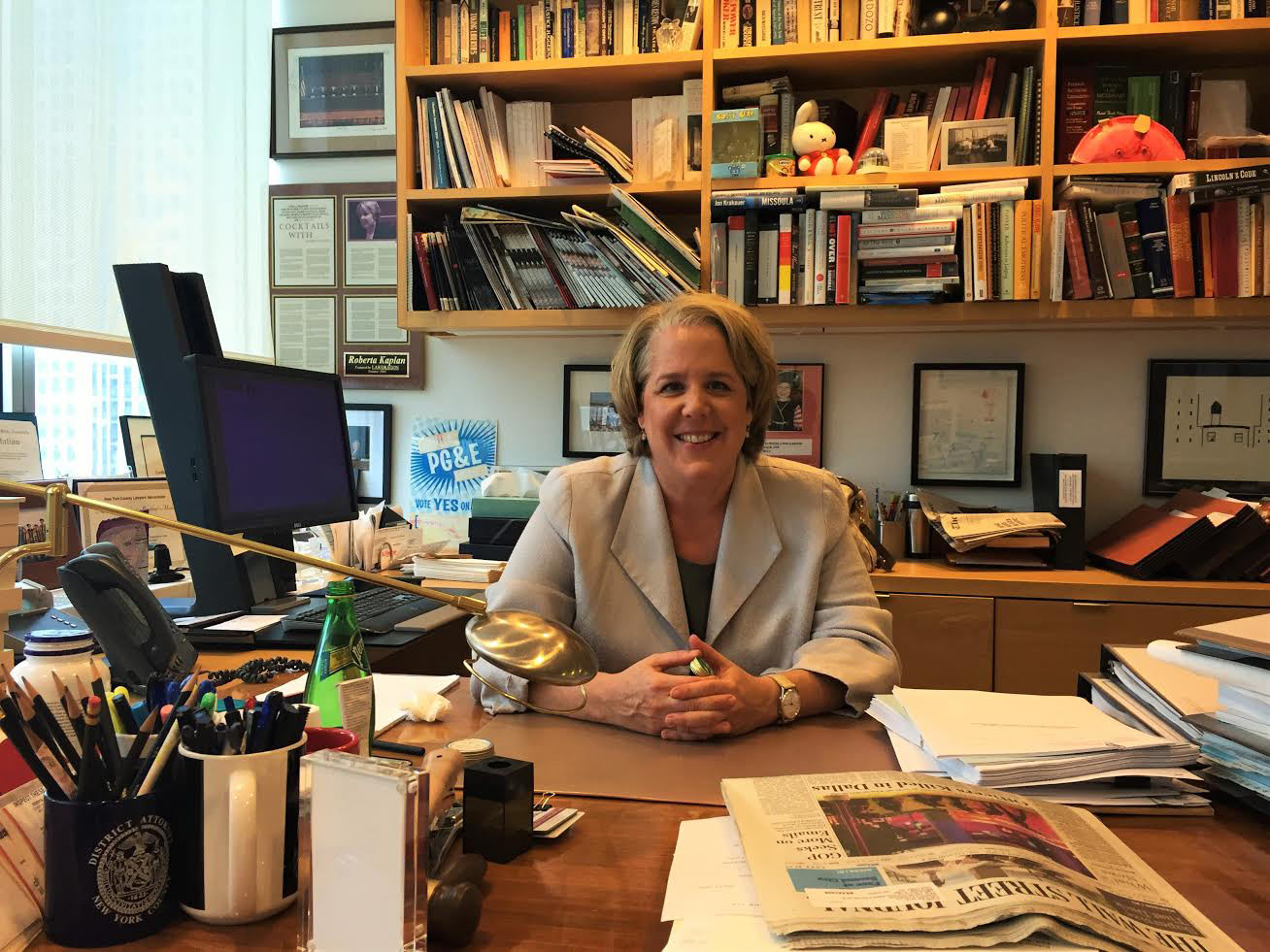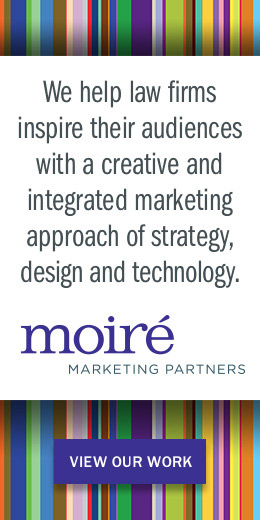When evaluating Roberta Kaplan’s career, it’s hard to overstate the importance of her decision in 2009 to take on a client named Edith Windsor, an elegant and charismatic gay widow who had been hit with $363,053 in estate taxes because the federal government did not recognize her as a surviving spouse. The case, of course, would send Kaplan to the Supreme Court in 2013 for the historic civil rights argument in U.S. v. Windsor, challenging the Defense of Marriage Act, which defined marriage between a man and a woman. The Supreme Court’s decision knocking down DOMA paved the way for its decision two years later in Obergefell v. Hodges recognizing the right of same-sex couples to marry.
The Windsor case not only secured a place in history for Kaplan; it also elevated her, as she says, to “probably a C-list celebrity, at least in certain circles.” Last year, the Paul, Weiss, Rifkind, Wharton & Garrison litigator published a book, Then Comes Marriage: United States v. Windsor and the Defeat of DOMA, providing an insider narrative of the case and detailing her own struggles with coming out gay. When we spoke with her in July, she had just finished being interviewed for an upcoming documentary about the case.
Can you talk about the impact Windsor has had on you professionally?
It turned out to be a very big plus for client development, but I had no idea. It was the farthest thought from my mind.
You do these kinds of cases for two reasons. One, because it’s the right thing to do, and because we’re part of, I still believe, a noble profession, and that noble profession includes the responsibility to give back. Secondly, it really presents an opportunity to get incredible experience that you might not get, particularly at big firms in paying matters. I don’t think I would ever have gotten the chance to argue a Supreme Court case in a paying matter before Windsor. It was pretty unusual at that time for anyone who wasn’t a SCOTUS lawyer to do that. So that was an incredible opportunity for me.
It must have been a welcome development to see the business community taking stands for LGBT rights as you litigated the case.
I don’t think anyone anticipated the kind of paradigm shift that occurred in society about these issues, during the time that Windsor was pending. So we filed the case in 2010, I argued it in the spring of 2013, and in that relatively short period, the world just completely changed. And you saw it in so many ways.
Among other things, the arguments that the other side was willing to make completely shifted. So by the time we got to the Supreme Court, they were really only making one of the six arguments they were making in 2010. They were just unwilling to articulate the others at that point. And part of it, I think is because of our case, and because of Edie, and the symbolism of her story. But there was just enormous cultural change.
And number two, and I completely agree with you on this, particularly recently, the degree to which the business community, and corporate America, and particularly Wall Street, which is a huge client base of Paul, Weiss, has supported this issue. Frankly it’s hard to exaggerate that. I know when we got the decision, our chair, Brad Karp, told me he received literally hundreds of emails, not a single email critical. Many of those emails were from our clients saying over and over again how proud they were and how thrilled.
So let’s go back to the very beginning. Why law in the first place?
When I was a kid in Cleveland I liked to talk a lot. There is a story I tell in the book about my grandmother. My uncle was in the Peace Corps in India then, and she had her letters that she wrote to him. And in one of the letters she’s describing a conversation with me. I was about three maybe, and she says to me, “Robbie, can you ever just stop talking?” I basically said to her, “No Grandma, I really can’t. I can’t help myself, I love to talk.” So at a certain point I realized pretty early that if you’re a lawyer you get paid to talk, and that sounded to me really, really appealing.
Sandra Day O’Connor became a Supreme Court justice when I was in high school, as I recall, and that was a big deal, to have the first woman justice on the Supreme Court. The other thing I think I realized really young, is that I wanted to come to New York. My mom had a subscription to The New Yorker, and I was avidly reading it every week. Every week I would wait for the new edition to come. And by the age of 10, I came up with a plan that I’m going to move to New York and I’m going to be a lawyer in New York.
You clerked for a legal legend, the late former New York State Chief Judge Judith Kaye. How did that happen?
Sheer serendipity. When I started at Paul, Weiss, we only had one woman litigation partner, the first, Colleen McMahon, and I got assigned to work with her on a paying matter very early. She also comes from Ohio, and we kind of hit it off from the get-go. And at the time, Judge Kaye had just become chief judge of the New York Court of Appeals, and she had decided she wanted to make this committee to reform jury service in New York, which was really a mess back then. Colleen asked me to serve, to kind of be counsel to that committee. Judge Kaye apparently asked Colleen then, could I come clerk for her. Colleen didn’t tell me until about a year later, until the report was written.
Did you seek out any mentors to guide you through the partnership process?
I didn’t really seek anyone out. I have a strong view that the best mentors are made when it happens naturally. So Colleen was certainly a mentor of mine, Judge Kaye certainly a mentor of mine. But in terms of making partner, it would’ve been Marty London, whom I got assigned to when I was actually just finishing up my clerkship for Judge Kaye. I got a call at home one day, saying can you start a few weeks early, we just had the biggest corporate scandal ever that just happened in Japan and I need you to get on a flight to Tokyo. That became this great adventure, and through that I built this wonderful relationship with Marty, who I still believe is one of the greatest lawyers ever. I just did a mediation yesterday and tried, to the extent I can, to mimic Marty’s style, and see if I can get his voice to speak through me.
You’ve been described as an “adrenaline junkie.” What’s that about?
You know I think one of the reasons why I love this place, even going back to the summers, is that I thrive in high-pressure situations where you’re expected to perform. You know, the work needs to be done in three minutes, and it needs to be done perfectly in three minutes, and it has to be done at the highest level of quality and creativity, and I love that.
What are some of the big challenges you see women in law facing?
One way I think in which it is harder to be a woman, particularly a woman litigator, is coming up with your own style and projecting that style in a way that people expect men to do naturally.
So what can young female litigators take away from that?
Develop your presence. As much as I want to project Marty London, I can’t be Marty London. Realize that the way you project has to be different than the way a guy might do that. I think particularly with juries, and I think the jury research has shown this, women encounter challenges there that guys don’t. Because jurors and judges and clients are used to seeing a guy stand up. They don’t think in their head that’s going to be a woman, and it takes some extra work on our part.
You’ve said that you approach every case with the same intensity, no matter if it’s a civil rights case or a commercial matter.
I was a great lawyer for Edie Windsor, only because, and I’m 100 percent convinced of this, only because I was a great lawyer previously, for Fitch and for JPMorgan and for Airbnb and for Sumitomo. I learned how to be a great lawyer by being a lawyer to those clients. And I applied those skills to Edie, in a way that I don’t think frankly all civil rights lawyers do. And in a way that led to the spectacular results that we got in Windsor. So I don’t see that separation at all.
It sounds like you have attained professional nirvana.
If you had told me, when I started here as an associate that I was going to be a partner, that I would be an out partner, that I would be married, to a woman, with a kid, and that I would win a landmark Supreme Court case, I would’ve told you that you were smoking something. You can’t have a life plan like that. The only thing I’ve learned from life is that when opportunity comes your way, you have to seize it. That I truly believe. My mom taught me that and she is absolutely right.



